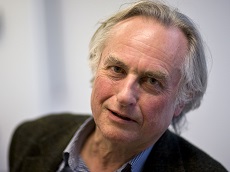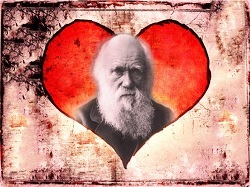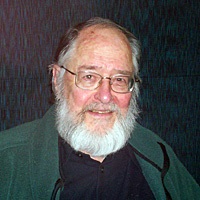|
TRANSLATE THIS ARTICLE
Integral World: Exploring Theories of Everything
An independent forum for a critical discussion of the integral philosophy of Ken Wilber
  Frank Visser, graduated as a psychologist of culture and religion, founded IntegralWorld in 1997. He worked as production manager for various publishing houses and as service manager for various internet companies and lives in Amsterdam. Books: Ken Wilber: Thought as Passion (SUNY, 2003), and The Corona Conspiracy: Combatting Disinformation about the Coronavirus (Kindle, 2020). Frank Visser, graduated as a psychologist of culture and religion, founded IntegralWorld in 1997. He worked as production manager for various publishing houses and as service manager for various internet companies and lives in Amsterdam. Books: Ken Wilber: Thought as Passion (SUNY, 2003), and The Corona Conspiracy: Combatting Disinformation about the Coronavirus (Kindle, 2020). Duplicating DarwinKen Wilber's and David Loye's
|
| "OLD VIEW OF EVOLUTION" | "NEW VIEW OF EVOLUTION" |
|---|---|
| Evolution is a random, strictly biological process, with no overall progress, purpose or direction, in a materialistic, accidental and meaningless universe. | Evolution is a wider, universal process of emergence, showing overall progress, purpose and direction, in a spiritual, meaningful and wonderful universe. |
Loye puts it even stronger in the audio. "The old Darwinian thing was used by robber barons to justify their depredations. It was used by Hitler in his conquest. It was used by Stalin to push forward the idea of, you know, survival of the fittest."

Richard Dawkins
It is at such a point that I get wary of these facile dichotomies, so popular in the alternative culture. We have on the one hand "the pseudo-Darwinian celebration of selfishness", which destroys everything that is valuable in society when taken to its logical consequences, and we have an uplifting view of love and unselfishness, which has to be introduced into our culture "before it is too late". The "negative" interpretation of Darwin prevails and leads to disaster. To save the world we need the "positive" interpretation of Darwin, stressing cooperation, mutuality, love and morality.
What I find particularly troublesome in Loye's discourse is his simplistic equation of neo-Darwinism with "survival of the fittest", selfishness and the ills of society. This betrays a superficial reading of even neo-Darwinism's most popular writer Richard Dawkins—a "Super Neo" Loye calls him. (Dawkins has even been held responsible for the rise of Tatcherism in the UK). Similar lines of reasoning equate atheism with immorality, nihilism and the end of the world as we know it. Most creationist objections to evolutionary theory don't hang on scientific details, but on its supposed detrimental moral effects. But if it is in the end all really a matter of "selfish gene/survival of the fittest mindset" vs. "love rules the world/Kosmos" this would mean the end of all mature and informed debate.
I'd like to highlight three points of contention, to start off this debate.
Survival of the Strongest?
For starters, isn't it entry-level understanding of evolutionary theory that "fittest" in "survival of the fittest" (not Darwin's term, but Spencer's) does not mean strongest, or most selfish, or aggressive, but "most adapted to the demands of the environment"? Here's a sample of a popular online source:
A majority of the general public may be able to describe natural selection as "survival of the fittest". When pressed for a further explanation of that term, however, the majority will answer incorrectly. To a person not familiar with what natural selection really is, "fittest" means the best physical specimen of the species and only those in the best shape and best health will survive in nature. This is not always the case. The individuals that survive are not always the strongest, fastest, or smartest. Therefore, "survival of the fittest" may not be the best way to describe what natural selection really is as it applies to evolution. Darwin did not mean it in these terms when he used it in his book after Herbert [Spencer] first published the phrase. Darwin meant "fittest" to mean the one best suited for the immediate environment. This is the basis of the idea of natural selection. (evolution.about.com)
There's even a quote attributed to Darwin which expresses this beautifully—even if it's authenticity is debated, it captures the spirit of his vision:
"It is not the strongest or the most intelligent who will survive but those who can best manage change." (www.goodreads.com)
So yes, physical strength can be selected for, but so can speed, or color, or agility, or flexibility—or yes, even human intelligence. This changes everything. Sometimes it helps to be big, but in different circumstances it helps to be small. It all depends. Competition and cooperation both exist in nature. Both can be included in a Darwinian perspective. If talent for competition works, it is passed on. If cooperation works, it is passed on too. Ironically, a talent for cooperation is even competitive!
As paleontologist Stephen Jay Gould phrased it well, in an essay about Kropotkin, a Russian biologist and activist who emphasized cooperation:
This charge against Darwin [that Darwinism undermines morality] is unfair for two reasons. First, nature (no matter how cruel in human terms) provides no basis for our moral values. (Evolution might, at most, help to explain why we have moral feelings, but nature can never decide for us whether any particular action is right or wrong.) Second, Darwin's "struggle for existence" is an abstract metaphor, not an explicit statement about bloody battle. Reproductive success, the criterion of natural selection, works in many modes: Victory in battle may be one pathway, but cooperation, symbiosis, and mutual aid may also secure success in other times and contexts. ("Kropotkin Was No Crackpot", Natural History, 1997)
Selfish Gene, Selfish Organism?
—Richard Conniff
Secondly, linking the concept of the "selfish gene" to selfishness in general and it's consequences for society overlooks the fact (made clear by Dawkins on numerous occasions but especially in the 30 year jubilee edition of The Selfish Gene, 2006, p. viii) that Dawkins intended the emphasis in that infamous book title to be laid on gene, not on selfish. The larger theoretical discussion is about which biological level is "selfish"—gene, organism, group, species, ecosystem?—in the metaphorical sense of being selected and passed on to future generations. This is lost on the general public, spoon-fed on journalism, which as Dawkins wittily remarks only reads a book by its title [apparently half the title, FV], and not "the long footnote that is the book itself".
It goes without saying that genes can't be selfish, because they don't have feelings in the first place. This most obvious thing still needs stressing, even decades after the book's first publication. This metaphor was suggested by Dawkins' publisher, for good reasons, though alternative titles such as The Immortal Gene were considered as well. (As an aside, would we all have become immortal had this title been chosen, instead of selfish?) Dawkins has many interesting things to say about metaphors and "good poetry", which leads to further research, and "bad poetry", which hinders it.
So Dawkins never claimed that we are inherently selfish because our genes are selfish. On the contrary! For assigning "selfishness" to the gene level—even if only in a strictly metaphorical sense—opened the possibility to have these genes create an organism that displays all kinds of behavior, from extreme selfishness to extreme altruism and everything in between. In the chapter "The Selfish Cooperator" in Unweaving the Rainbow (1998) Dawkins opposes both the notion that humans are essentially selfish and that they are essentially good-natured (as Frans de Waal has argued). Not surprisingly, we are both! And both traits have genetic components which can therefore be transmitted to subsequent generations. The easy logical step from selfish genes to selfish organisms is a non sequitur.
And yes, Darwinism has been misinterpreted often to imply that selfishness is our natural state, and therefore should rule the world, but the first statement is definitely wrong and the second one doesn't follow from the first. (Is natural always right?). But does the existence of false money disprove the existence of real money? Former Enron CEO Jeff Skilling's favorite book was The Selfish Gene, which left Dawkins "mortified" when he read about this in The Guardian (The God Delusion, Chapter 6: The Roots of Morality, p. 215n.) This grave misunderstanding gets corrected in the same footnote, by referring to the article "Animal Instincts" written by journalist and animal science writer Richard Conniff, who writes perceptively and concisely:
Genes may be selfish. But people have evolved to be social. And these days, the Darwinian view includes an understanding that cooperation and even altruism are part of our genetic heritage. (The Guardian, 27 May 2006)
So who's to blame for this misunderstanding? It is Dawkins here, for sure, who gets misunderstood and misrepresented, though the catchy book title hasn't exactly been helpful in removing this widespread misunderstanding.
A Divine Hand in Nature?
And thirdly, it might very well be true that the later Darwin wrote about phenomena that are specific to the human species. (Ironically, it was precisely the "Super Neo" Dawkins who suggested that we need the concept of "memes" to account for cultural phenomena. And no, this was not a later addition to his otherwise "reductionistic" works, but already occurs in chapter 11 of The Selfish Gene published in 1978!) Many contemporaries of Darwin, most notably the co-author of the theory of natural selection Alfred Wallace himself, thought that natural selection could perhaps explain the manifold phenomena of pre-human evolution, but that the human species was something entirely different, requiring a metaphysical explanation (Wallace became a spiritualist in his later years).
So Darwin's whole intent and purpose of writing The Descent of Man was to argue for a fully naturalistic explanation of the human species.[1] There was no Divine Plan, no Special Creation, no Hand of God infusing the great apes with intelligence. This was "Darwin's Dangerous Idea" in a nutshell, as Dennett's book by the same title has it. Has Daniel Dennett "distorted" Darwin, as Loye claims in the audio? What is this "dangerous idea"? That evolution is thinkable and explainable without postulating purpose, design, a Divine Plan etc. Now that was a vision that would meet with strong resistance in the nineteenth century (and in the US even in this 21st century)! Not the opposite view, that human beings have some special status over nature, for that was and is a common understanding. Tempting as it is to see things in nature as "designed" (by a "Designer" or Eros), a naturalistic explanation is possible that does away with that hypothesis (a temptation Ken Wilber has not been able to withstand).
As I wrote a few years ago in my paper on Wilber's misreading of evolutionary theory:
In spiritualist accounts, the scientific theory of evolution is often presented in a rather gloomy, not to say appalling fashion: according to the scientific worldview, we live in a meaningless and purposeless universe and are the products of random chance. Then, at the very moment you are about to kill yourself, the spiritualists present a much more appealing view of evolution: we are part of a universal process which is not only heading for Spirit, but driven by It as well. It's all "onwards and upwards" in this view of life. Who in his right mind would not vote for the second option?
We might well heed Richard Dawkins' admonition here, that in science, what counts is not that an idea is comforting, but that it is true... In the final analysis these emotional judgments don't count. (And for some, of course, science is appealing and spirituality appalling...)
In my opinion, facile dichotomies of aggression vs. love—often a variation of male vs. female (Loye is involved with the Center for Partnership Studies with his wife, the author Rianne Eisler) don't help our understanding of the processes of evolution. Framing neo-Darwinism as producing and being responsible for a grim prospect of our society, and contrasting it to a world of love an harmony that should save the world comes across as well-meaning but hopelessly New Age.
I must admit that I haven't read any of Loye's many self-published works on Darwin, but this online dialogue with Ken Wilber supposedly being a good summary of it ("You have done a brilliant job of summarizing all five books I've written!") is not promising. I am actually surprised that someone as erudite as Loye would engage in superficial treatments of neo-Darwinism like this.
Talking about misinterpreting Darwin!
NOTES
[1] See: David Lane & Andrea Diem-Lane, Darwin's Moral Sense, The Evolution of a Conscience, www.integralworld.net

